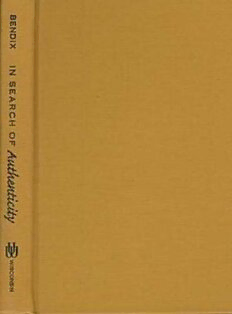
In Search of Authenticity: The Formation of Folklore Studies PDF
320 Pages·1997·17.374 MB·English
Most books are stored in the elastic cloud where traffic is expensive. For this reason, we have a limit on daily download.
Preview In Search of Authenticity: The Formation of Folklore Studies
Description:
Authenticity is a notion much debated, among discussants as diverse as cultural theorists and art dealers, music critics and tour operators. The desire to find and somehow capture or protect the “authentic” narrative, art object, or ceremonial dance is hardly new. In this masterful examination of German and American folklore studies from the eighteenth century to the present, Regina Bendix demonstrates that the longing for authenticity remains deeply implicated in scholarly approaches to cultural analysis. Searches for authenticity, Bendix contends, have been a constant companion to the feelings of loss inherent in modernization, forever upholding a belief in a pristine yet endangered cultural essence and fueling cultural nationalism worldwide. Beginning with precursors of Herder and Emerson and the “discovery” of the authentic in expressive culture and literature, she traces the different, albeit intertwined, histories of German Volkskunde and American folklore studies. A Swiss native educated in American folklore programs, Bendix moves effortlessly between the two traditions, demonstrating how the notion of authenticity was used not only to foster national causes, but also to lay the foundations for categories of documentation and analysis within the nascent field of folklore studies. Bendix shows that, in an increasingly transcultural world, where Zulu singers back up Paul Simon and where indigenous artists seek copyright for their traditional crafts, the politics of authenticity mingles with the forces of the market. Arguing against the dichotomies implied in the very idea of authenticity, she underscores the emptiness of efforts to distinguish between folklore and fakelore, between echt and ersatz.
See more
The list of books you might like
Most books are stored in the elastic cloud where traffic is expensive. For this reason, we have a limit on daily download.
